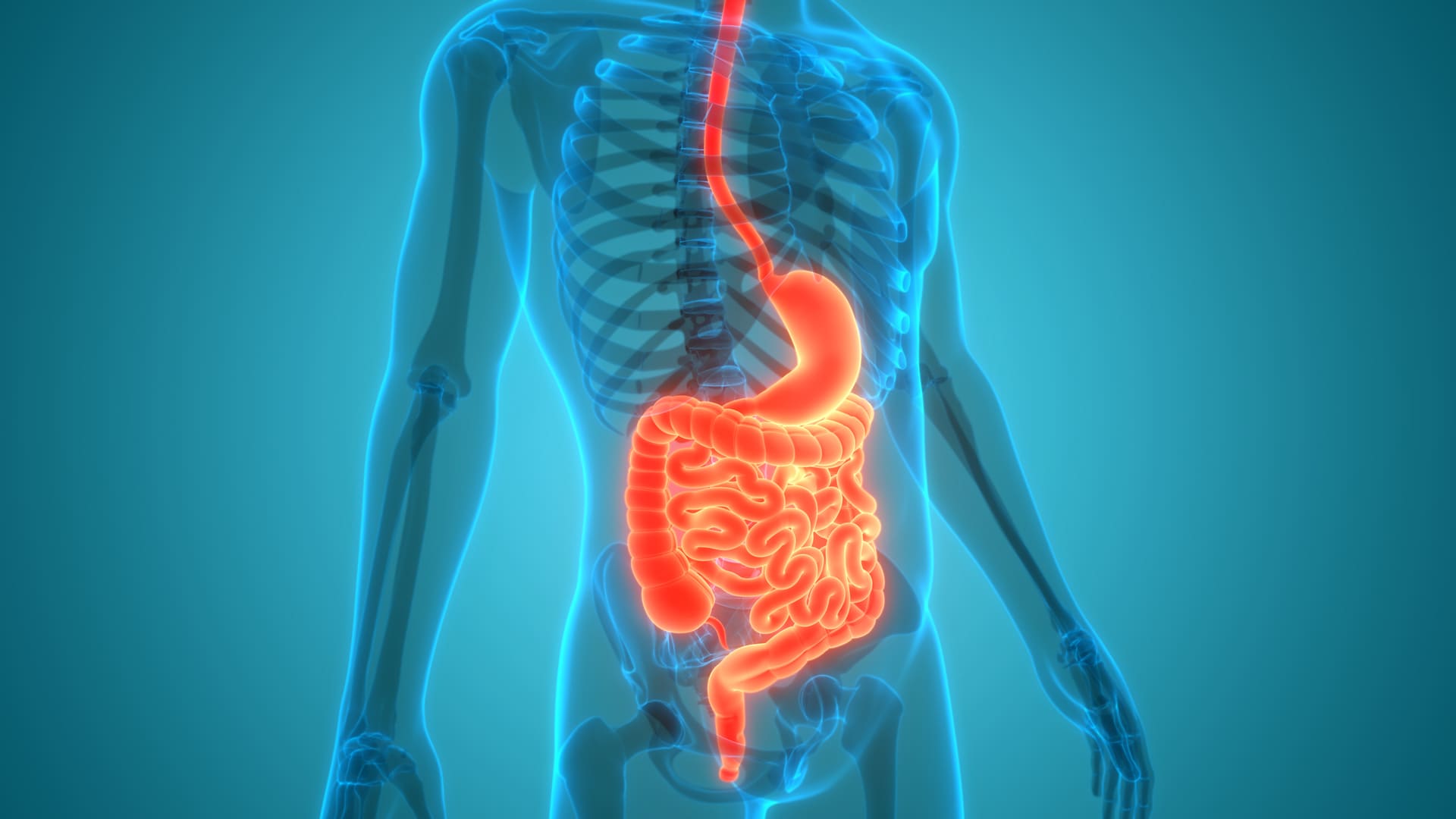
When you get a terrible night’s sleep, you’ll probably be expecting tiredness and perhaps a headache the following day. However, you may be shocked to learn that poor sleep can also lead to a range of stomach problems. So, what exactly is the relationship between sleep and your stomach, and how are they connected? What can happen to the stomach if we do not have a sensible sleep routine? This article will answer all of these questions and offer an exciting new supplement designed to keep your wellbeing routine on track.
The Stomach And Its Functions
The stomach is an organ that breaks food down and is the first stop in the digestive tract. The lining of the stomach secretes enzymes and hydrochloric acids to break down food before it continues its journey through the digestive system. The acids also work to kill any microbes (organisms that can cause diseases) that may have found their way into the body, along with processing foods and drinks. Additionally, the stomach creates a substance that makes it possible for the body to absorb the essential vitamin B12. The stomach is the widest part of our digestive system and not only digests food but stores it as well. It can store just over one litre (or one quart) of food. It usually takes roughly four to six hours for food to be digested.
As we can see, the stomach is a hard-working organ and is very important to our overall health and wellbeing. So, how does sleep affect our stomach function, and what are the repercussions of poor sleep on our gut health?
Gut health and sleep are interconnected. In fact, it’s a two-way street. Digestive health can play a part in how well someone sleeps, and sleep can affect how well our digestive system functions. There are multiple ways in which sleep aids our digestive system:
- Sleep gives our digestive system a chance to recuperate. Our bodies demand glucose (our primary energy source) throughout the day, so our digestive system works very hard to break down food and meet this demand. When we sleep, our need for glucose is hugely reduced, so our metabolism and digestive system can slow down and rest for the next day.
- Sleep provides energy for our digestive system to function. When we sleep, our energy levels can replenish. This energy is essential for our digestive systems to work correctly. Without adequate energy, our digestive system cannot break down food as efficiently.
Let’s discover some of the specific ways that lack of sleep can affect our gut health.
1.Lack Of Sleep Can Cause Stress And Affect The Gut

When we don’t sleep enough, our hormones can become imbalanced. This can cause cortisol (the stress hormone) to rise. This increased stress can lead to intestinal permeability (or leaky gut), where food and toxins pass through the intestine and into the bloodstream. This may potentially lead to a whole host of challenges, such as stomach pains, inflammation, food sensitivity and bloating.
As we can see, stress is the enemy of the digestive system. It can also exacerbate IBS (Irritable Bowel Syndrome). The reason stress affects our digestion so much is because our body has no sense of moderation. When we feel stressed, our fight-or-flight instincts are triggered, which prompts the body to redirect nutrients to structures such as the heart, muscles and lungs whilst shutting down other bodily functions – including the digestive system. These can lead to bouts of constipation or diarrhoea. Because undigested food and waste products will be sitting in your digestive tract, this can cause unfriendly bacteria to increase and stimulate inflammation.
2.Sleep Deprivation Can Affect Your Diet
Doctors have also informed us that, ideally, we shouldn’t eat within three hours of going to sleep. This is because our bodies will have to tackle digestion and absorption when they should be focused on recuperating for the next day. However, when we do not sleep enough, our bodies cry out for more food to help supply the energy we need. And when we are tired, we are then more likely to turn to unhealthy food choices for spurts of energy (such as saturated fats, sugar and processed carbs). Unsurprisingly, these foods are bad for our gut and overall health.
When we’re tired, the science behind our unhealthy food choices is to do with two hormones, ghrelin and leptin. Our levels of ghrelin (the hunger hormone) become elevated after a poor night’s sleep, whilst our levels of leptin (an appetite suppressor) decrease. This can lead to unhealthy bingeing, which in turn impacts our digestive system. Processed carbohydrates are harder for our systems to break down, which can lead to issues such as constipation. Sugar can also feed unfriendly bacteria in the gut, which can lead to symptoms such as diarrhoea and bloating.
3.Sleep Hormone Problems May Be Related To GERD
Melatonin is known as the sleep hormone. Our bodies produce more of it at nighttime because it helps us to fall asleep. However, melatonin also helps regulate gastrointestinal motility (the movement of the smooth muscles in the gastrointestinal tract), thereby aiding digestion. When our melatonin levels are thrown off, it can be hard to sleep, and this may possibly lead to GERD (Gastroesophageal Reflux Disease). GERD is a long-term digestive disease where the acid in the stomach refluxes into the throat – a horrible and debilitating illness.
So, now that we have seen just how intrinsically linked sleep and our digestive system are – and how fundamental sleep is when it comes to maintaining digestive health – it is all the more important to focus on a sensible sleep routine. After all, better sleep can lead to better digestion (which leads to better overall health). So, what can we do to get the most out of our sleep routine? A new sleep supplement by Yawns could be just the helping hand you’ve been looking for.
A Dreamy New Supplement

Here at Yawns, we have developed unique sleep capsules called Night Caps – made from world-renowned natural ingredients. Not only that, but the formula has been crafted specifically to help you unwind and relax every night. Furthermore, it’s 100% organic! Let’s take a closer look at the cherry-picked components that you will find in each sleeping capsule:
- Ashwagandha powder: This is an intriguing herb also known as Indian Ginseng. Ashwagandha powder may help you manage some stress symptoms, impact your blood sugar levels and influence natural testosterone levels in men. It might also affect some signs of inflammation, cholesterol and even potentially decrease specific mental health symptoms relating to anxiety and depression. Furthermore, it has been suggested that it can impact your natural brain function too!
- Valerian root powder: This plant is used and trusted all over the world. It may help you to sleep and also may reduce some anxiety symptoms.
- Griffonia seed extract: This extract can potentially help you sleep more peacefully and influence your serotonin levels (a hormone that helps fight signs of depression and affects how you feel). Griffonia seeds may also reduce migraine frequency – if you suffer from them!
- Black pepper powder: Black pepper is not only a well-known spice, but it also has many encouraging properties. It is high in antioxidants and may also have some potential anti-inflammatory properties. It might even affect your natural brain function, cholesterol-related symptoms and blood sugar levels.
Our sleep capsules contain all of these premium plant extracts. You know precisely what is included in each one (and the packaging is transparent, just like our ingredient list!). We have toiled over this unique formula to make it as promising as possible. It’s a supplement that has been designed for those who are searching for a natural way to supplement their sleep routine through natural means.
As we have seen, our gut health is vital to our overall health, and sleep is an essential factor in keeping our digestion as healthy and regular as possible. With some help from nature, our Night Caps may help you to pursue your best night yet, two capsules at a time.